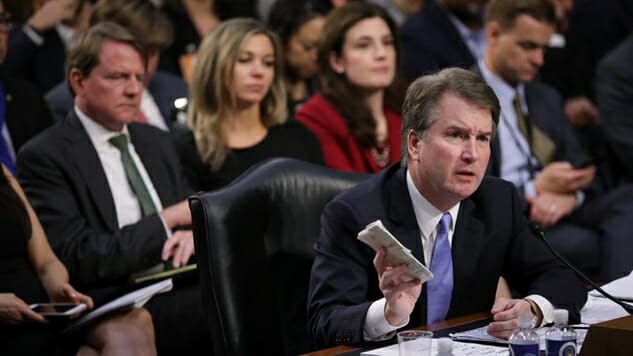Does Brett Kavanaugh Have a Gambling Problem? Democrats Want to Know
Photo by Drew Angerer/Getty
This may sound like partisan hackery, and it very well could be, but this aggressive question from a Democratic senator to the Republican nominee for the Supreme Court is based on a very strange and very true story, and may hint at inside knowledge. Per The Washington Post:
Supreme Court nominee Brett M. Kavanaugh incurred tens of thousands of dollars of credit card debt buying baseball tickets over the past decade and at times reported liabilities that could have exceeded the value of his cash accounts and investment assets, according to a review of Kavanaugh’s financial disclosures and information provided by the White House.
White House spokesman Raj Shah told The Washington Post that Kavanaugh built up the debt by buying Washington Nationals season tickets and tickets for playoff games for himself and a “handful” of friends. Shah said some of the debts were also for home improvements.
In 2016, Kavanaugh reported having between $60,000 and $200,000 in debt accrued over three credit cards and a loan. Each credit card held between $15,000 and $50,000 in debt, and a Thrift Savings Plan loan was between $15,000 and $50,000.
Senator Sheldon Whitehouse is asking the question also thanks to a publicly disclosed e-mail from 2001, where Kavanaugh wrote that he has blown “still another game of dice.”

Now, as someone who has been gambling for a long time, I feel the need to defend Brett Kavanaugh (*barf*). Just because he gambles does not disqualify him from holding federal office. It’s crazy that we live in a country where Wall Street can literally gamble with pensions of entire cities on complicated financial instruments that they don’t even understand, but the common man can’t put $5 on a football game. However, being five to six figures in debt for Nationals tickets is incredibly strange, and I will let lawyer Luppe B. Luppen detail why we cannot just outright dismiss Kavanaugh’s baseball tickets as just another overpriced quirk of our nation’s capital.
Okay let’s lay out some data. Here are all of Kavanaugh’s financial disclosures: https://t.co/4SMvPhRPyi
And his liabilities statements for 2014-2017 (each is filed in May the following year; value code J = $15,000 or less, and value code K = $15,000-$50,000): pic.twitter.com/sxNLfpXy89
— southpaw (@nycsouthpaw) July 21, 2018
Let’s look at the previous four years.
2010: 3 card balances, each <$15k
2011: 3 card balances, each <$15k
2012: 3 card balances, 2 of them <$15k and 1 between $15k – $50k
2013: 1 card balance between $15k – $50k pic.twitter.com/zYgtokOaCl
— southpaw (@nycsouthpaw) July 21, 2018
Think we need four more years? Let’s do four more years.
2006: 3 card balances, between $15k – $50k
2007: 3 card balances, between $15k – $50k
2008: 4 card balances, two <$15k and two between $15k – $50k
2009: 4 card balances, each <$15k pic.twitter.com/P3332sFnrs
— southpaw (@nycsouthpaw) July 21, 2018
Another question: If Kavanaugh was in fact reimbursed for a large baseball-related expense (between $45k and $150k?) in 2017, shouldn’t that be reported in the 2017 report’s reimbursements section?
I don’t see it. https://t.co/Q3W3u4QCR9pic.twitter.com/SeSIs9xMUv
— southpaw (@nycsouthpaw) July 21, 2018
According to guidance on the judiciary’s website, credit card debt isn’t required to be disclosed unless it exceeds $10k on a per account basis. So each of those “<$15k” credit card entries from Kavanaugh above likely represents at least a $10k liability. https://t.co/12mhvv5UDOpic.twitter.com/l04h4VdduM
— southpaw (@nycsouthpaw) July 22, 2018
I guess the word exempt indicates Kavanaugh is asserting that he doesn’t need to disclose his reimbursements and gifts?
— southpaw (@nycsouthpaw) August 1, 2018
The question as to how a Supreme Court nominee racked up more debt than he had assets is a legitimate one, and gambling debts is an obvious question to ask. Sheldon Whitehouse has asked many more questions pertaining to gambling than just whether Kavanaugh has a problem with it, and this looks like it may be a story that won’t go away until we get a concrete answer as to how someone could accumulate up to six figures in debt for freaking baseball tickets.
Jacob Weindling is a staff writer for Paste politics. Follow him on Twitter at @Jakeweindling.







































